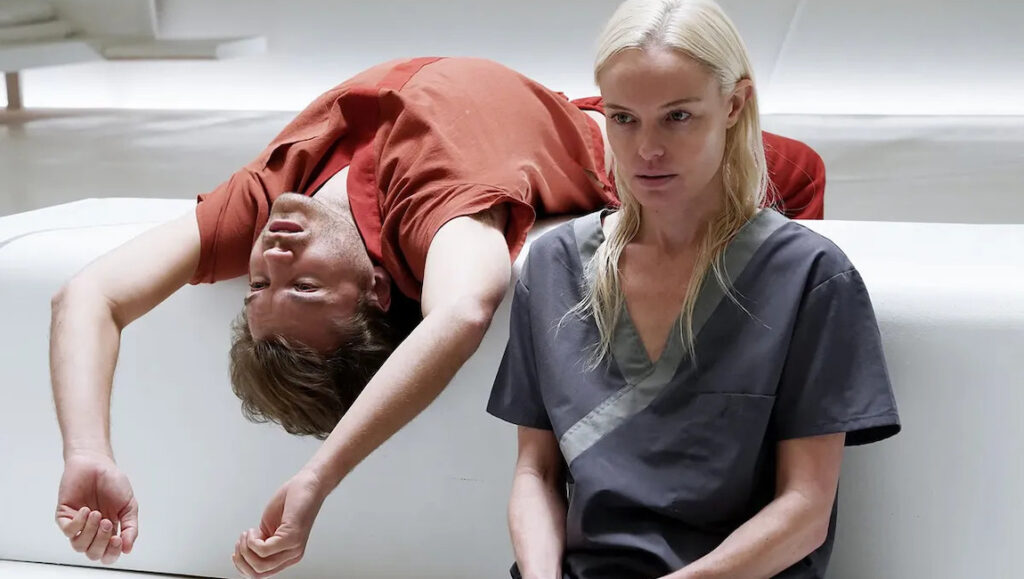The Immaculate Room is a poorly paced and thematically shallow film that bludgeons each and every one of its talking points to death.
In premise alone, new relationship drama The Immaculate Room feels like a throwback to the likes of Indecent Proposal, its utterly preposterous storyline inspiring dinner party and water cooler conversations of, “What would you do?” as opposed to cogent thoughts on the film itself. The setup is simple: couple Mikey (Emile Hirsch) and Kate (Kate Bosworth) have been granted the opportunity to participate in a world-famous study known as The Immaculate Room, in which they must spend 50 days together in a stark white room that contains one bed, one seating bench, and a single bathroom. They will have no access to the outside world, and they will be watched by a brilliant and infamous psychologist whose last study resulted in the destruction of an entire family. If successful, they will receive five million dollars; if one of them leaves and the other stays for the remaining time, that individual will get one million dollars. The big question: can they do it? More precisely, could you?
Such fodder seems tailor-made for the likes of Black Mirror or The Twilight Zone, where 45 minutes is all that is necessary to make its central thorny conundrum dramatically thrilling. At 90 minutes, the movie feels as if it is unspooling in real time, as writer-director Mukunda Michael Dewil does nothing either visually or thematically interesting with the material at hand. The characterization is beyond rote, with Mikey a loud and abrasive “artist” who desperately wants to attain independence from his wealthy and controlling father, while Kate is more calm and controlled but cutting in her remarks in ways that are borderline cruel. Both suffer from some sort of unnamed childhood trauma that the room will eventually prey upon and use against them, as well as the fact that Mikey and Kate have recently gotten back together after a split and stupidly see this opportunity as a way to renew their bonds of love. Yes, The Immaculate Room is yet another entry in the suddenly ubiquitous subgenre of forced relationship counseling, no doubt inspired by the early days of Covid-induced quarantine, where hell was forced quality time with loved ones. Dewil rushes through initial events, setting up rules and routines then skipping ahead to day 23, as if it wouldn’t be far more interesting to get to know these individuals and witness the psychological fallout they endure as they desperately try to acclimate to their current situation. Instead, we get a montage of Mikey running, Kate meditating, and both of them eating meals that consist of nothing more than a carton of liquid nutrients. Mikey is the first to lose his shit, befriending a bug and questioning his resiliency as a human. Kate keeps things bottled up, a powder keg conceivably ready to go off at any given moment, but Bosworth underplays the role to such a ridiculous degree that she seems more likely to fall into a coma at any given moment.
Dewil goes out of his way to attempt to bring some spice to the proceedings, failing to realize that the real drama is inherent in the premise itself, thus proving the filmmaker’s utter lack of faith in his own material. Introducing both Chekov’s gun and Ashley Greene Khouri’s naked breasts seems a bit desperate, and robs the movie of any sort of realism it so desperately wants to achieve. That’s not to say the film isn’t topical, as it delves into the insidious ways that both money and capitalism hold sway over us both as a society and as individuals simply trying to stay afloat within it. Money is nice, but is it worth one’s humanity? “This isn’t a room, it’s a mirror, “ Mikey helpfully explains at one point, because this film never met a talking point it couldn’t bludgeon to death. Although in all honesty, what else do these ciphers have to talk about? Had Dewil displayed any sort of technical chops, it would make the proceedings far more involving, but he opts for a lot of static shots that rob the film of the claustrophobic atmosphere that should be inherent within its very premise. Meanwhile, Hirsch overacts to a grating degree, and one is left to ponder how this man, who was convicted of assault against a female studio executive, can still get work. It’s certainly a more compelling ponderance than the one at the heart of The Immaculate Room, which refuses to dig beneath its pearly white surface. Turns out, money is indeed the root of all evil. Viewers, make sure to pick your jaw up off the floor on your way out.
Published as part of Before We Vanish — August 2022.


Comments are closed.